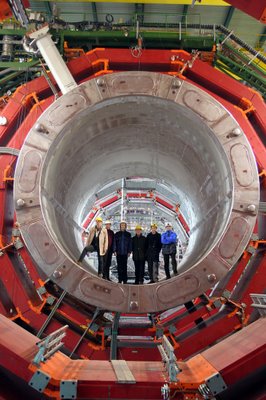Ah, the pleasure of big machines
 Nothing like a dose of hard physics first thing in the morning. Even if you don't get the point of this post, just wallow in the numbers.
Nothing like a dose of hard physics first thing in the morning. Even if you don't get the point of this post, just wallow in the numbers.
The world’s biggest magnet reached full power yesterday. This 10,000-tonne beast generates a magnetic field more than 100,000 times higher than the Earth’s and stores 2.5 gigajoules of energy. That can melt 18 tonnes of gold, in case that fact is useful to you one day.
The magnet is part of the Compact Muon Solenoid experiment (another example of scientist hilarity as this huge machine is several stories high and more than 13m long – not too compact, really) that will run on the Large Hadron Collider, a particle accelerator being built at Cern laboratory in Geneva. It will help work out where mass comes from and what the “missing” 96% of the universe is actually made from.
The LHC has been underconstruction for several years now and is the most advanced bit of kit that particle physicists will have to work out how the universe came to be as we see it today after the big bang nearly 14 billion years ago.
From the Wikipedia article on the LHC on what physicists will use the collider to find out:The LHC is one of the most exciting projects in physics and, let's not beat about the bush, a marvel of engineering. Here's a film of how the CMS is put together and how it works. Here's an article I wrote on the LHC a while back.
- Is the popular Higgs mechanism for generating elementary particle masses in the Standard Model violated? If not, how many Higgs bosons are there, and what are their masses?
- Will the more precise measurements of the masses of baryons continue to be mutually consistent within the Standard Model?
- Do particles have supersymmetric ("SUSY") partners?
- Why are there violations of the symmetry between matter and antimatter?
- Are there extra dimensions, as predicted by various models inspired by string theory, and can we "see" them?
- What is the nature of the 96% of the universe's mass which is unaccounted for by current astronomical observations?
- Why is gravity so many orders of magnitude weaker than the other three fundamental forces


No comments:
Post a Comment